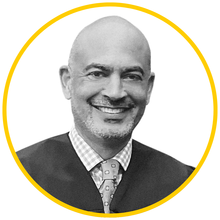Influence in the Legal Landscape

The Hon. Leonard Strand (90JD), a judge with the U.S. District Court for the Northern District of Iowa, has succinct words of wisdom for anyone who aspires to a career in the judiciary: “Stay out of trouble. Get courtroom experience. And definitely learn how to write.”
Strand did not originally intend to pursue a judgeship. While a law student, he planned to be a litigator, and he sharpened his writing skills by contributing to the Journal of Corporation Law. Upon graduating, he joined Simmons Perrine Moyer Bergman, where he specialized in commercial litigation and employment law. During his first decade as a trial lawyer, he saw firsthand the influence judges have in the legal ecosystem and began to think about making a professional pivot. “I loved being in the courtroom, and I have a problem-solver personality,” Strand said. “I realized that being a judge might be a good fit for me.”
Strand became a federal magistrate judge in 2012, and in 2015, he was nominated to serve as a district judge in the Northern District, where he has been ever since. “It is immensely satisfying work,” he said. “I enjoy the intellectual challenge of dealing with radically different issues week to week, and sometimes even day to day. And I enjoy working with smart and curious law clerks, many of whom come from Iowa Law. Reflecting back, the way Iowa Law taught me to approach the law has been a huge factor in whatever successes I have had as both a lawyer and a judge.”
Fairness to All Litigants

Like many of his fellow alumni in the judiciary, the Hon. Jeffrey Armistead (01JD) became a judge by way of a multifaceted career path.
After graduating law school, Armistead practiced corporate law with Cooley in Silicon Valley, followed by a period in Washington, D.C., where he litigated administrative matters at the U.S. Department of Agriculture. A California native, Armistead decided to return to the West Coast and landed a job as a staff attorney at the Oregon Court of Appeals. In 2022, he was appointed to his current position: U.S. magistrate judge with the U.S. District Court for the District of Oregon.
“My work calls for a lot of judicial writing,” he said, “and it’s important to realize that the writing we do is not an exercise; it affects real people and real communities.” He credits Iowa Law’s focus on writing and analysis with giving him these essential skills.
Armistead has a docket of both civil and criminal cases, with the latter all too often related to the fentanyl crisis that Oregon is experiencing. “We always emphasize fairness to all litigants,” he said. “Everybody matters and is given a fair shot. Even if they are not successful, at least we heard their arguments. We listened.”
Journalism and Juvenile Justice

Writing also played a part in the Hon. Stephanie Rose’s (96JD) trajectory to the federal bench. The chief U.S. district judge for the Southern District of Iowa—and the first female district court judge in the district, where she has served since 2012—Rose worked as a newspaper journalist prior to attending law school. “I really loved journalism,” said Rose, whose unusual beat included covering, among other subjects, dirt track racing. “I always thought it would serve me well no matter what career I chose, because it teaches you to write well, interview people, and be accurate.”
Rose also had a deep interest in juvenile justice, and one of her original goals was to one day find meaningful work that could help reform Iowa’s foster care system. “My parents were foster parents, and I saw how the system had a lot of issues,” she said.
Rose volunteered as a special advocate for abused and neglected children but found that “ultimately I wanted to make a difference in the system that caused these problems in the first place.” A game-changing clinical placement in the U.S. Attorney’s Office during her 3L year led to a job there upon graduation, “and that tipped me into a career in criminal prosecution and ultimately into the judiciary.”
Today, Rose said that her court hears a wide range of cases that involve everything from child exploitation to the constitutionality of certain laws. “It is rewarding to have a voice in important issues and to help people who deserve to be helped,” she said. “And it is also gratifying to stop people who are causing trauma to society.”
Freedom to Make a Difference

The desire to make a difference—in as thoughtful a manner as possible—is what inspired the Hon. Susan Bolton (75JD) to pursue a career on the bench. A senior judge with the U.S. District Court for the District of Arizona, Bolton developed her interest in the judiciary during the 12 years she spent in private practice. As a commercial litigator, she regularly appeared in state court, “and that sparked my interest in becoming a judge.” She began her career as a state court judge in 1989 and was appointed to the federal bench in 2000. “One reason I was motivated to leave private practice is that it is driven by billable hours,” she said. “It was liberating to become a judge and find I could devote as much time as I needed to a case without consideration of its monetary value.”
Bolton notes that her court’s complex caseload has been largely shaped by Arizona’s unique profile as a border state that also has 21 Native American reservations. “We have an extremely high volume of criminal cases that involve people or things crossing the border illegally,” she said. “Additionally, the federal courts have jurisdiction over felonies committed on the reservations, so this results in a higher felony caseload than you might see in other federal districts.”
Now a senior judge, Bolton can work a less demanding schedule than when she was an active judge. But she still remains committed to seeing justice served in Arizona and beyond, and is grateful to Iowa Law for helping her realize that goal. “I don’t think my career would have gone as well as I think it has,” she said, “were it not for the education I received in Iowa.”
